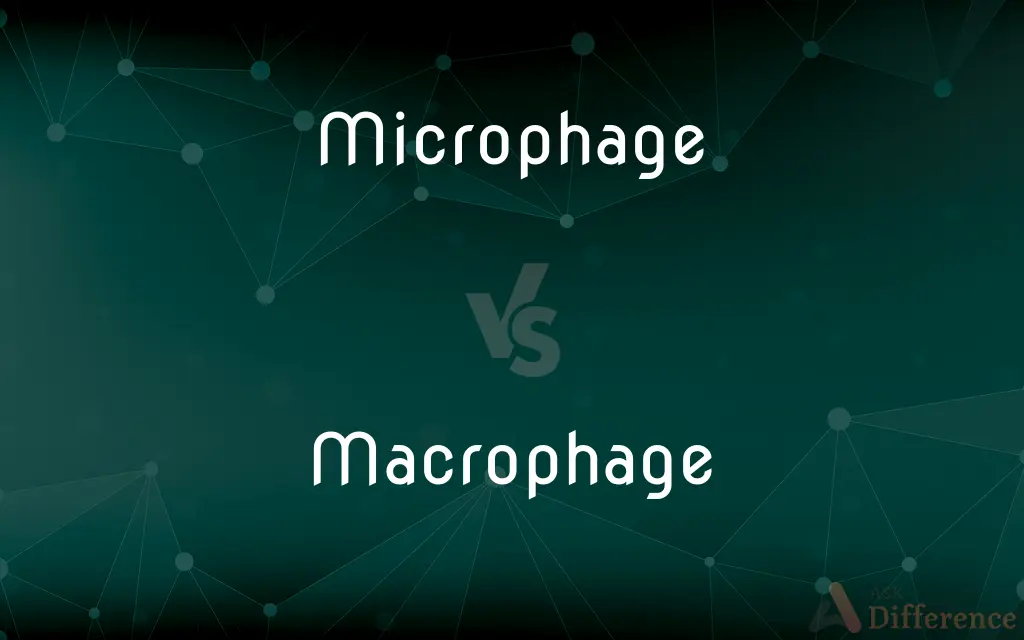Microphage vs. Macrophage — What's the Difference?
By Fiza Rafique & Urooj Arif — Updated on March 21, 2024
A microphage is a term less commonly used in modern biology, confused with or inaccurately used to refer to phagocytes or smaller white blood cells. A macrophage is a type of white blood cell in the immune system, key in eliminating pathogen and debris.

Difference Between Microphage and Macrophage
Table of Contents
ADVERTISEMENT
Key Differences
Microphages, a term not widely used in contemporary scientific literature, is sometimes mentioned in the context of smaller phagocytic cells, like neutrophils, which are part of the immune response. They are known for their role in the early stages of the immune defense, quickly responding to infections. On the other hand, macrophages are large phagocytic cells that play a crucial role in both innate and adaptive immunity. They are responsible for engulfing and digesting cellular debris, foreign substances, microbes, cancer cells, and anything else that does not have proteins specific to healthy body cells on its surface, marking it as foreign.
Macrophages originate from monocytes, a type of white blood cell that circulates in the bloodstream. Upon detecting infection or inflammation, monocytes migrate to the affected tissue, where they differentiate into macrophages. This transformation allows them to perform their role in the immune response more effectively. Microphages, by the older definition, act more immediately upon infection but have a less diverse role compared to macrophages, which not only ingest pathogens but also play a significant role in alerting the rest of the immune system to the presence of invaders.
One of the key distinctions between microphages and macrophages is their size and the complexity of their roles in the immune system. Macrophages are larger, have a longer lifespan, and are involved in complex processes such as antigen presentation, which is crucial for the activation of the adaptive immune system. In contrast, microphages (as they are occasionally referred to) primarily focus on the quick engulfment and destruction of pathogens.
Furthermore, macrophages have a remarkable ability to adapt to different tissue environments, transforming into specialized forms that carry out unique functions tailored to the specific needs of the tissue they reside in. This adaptability is essential for tissue homeostasis, repair, and defense against pathogens. The term microphage does not encompass such a wide range of functions and is largely obsolete in the detailed understanding of immune responses.
Comparison Chart
Definition
Less commonly used term; refers to smaller phagocytes.
A type of white blood cell involved in the immune response.
ADVERTISEMENT
Role in Immunity
Early, rapid response to infection.
Engulfing pathogens, dead cells, and debris; immune regulation.
Origin
Term sometimes associated with neutrophils.
Derived from monocytes in the bloodstream.
Size and Lifespan
Smaller cells with a shorter lifespan.
Larger, with a longer lifespan and more complex roles.
Functions
Primarily engulfment and destruction of pathogens.
Phagocytosis, antigen presentation, cytokine production, tissue repair.
Adaptability
Limited; focused on immediate response.
Highly adaptable to different tissue environments.
Modern Usage
Rarely used; often considered outdated.
Widely used and studied in immunology.
Significance
General reference to part of the immune system's cellular response.
Essential for both innate and adaptive immunity, tissue homeostasis.
Compare with Definitions
Microphage
An outdated term for certain small phagocytic cells.
Microphages quickly respond to bacterial infection by engulfing the bacteria.
Macrophage
A key cell in the immune system's defense.
Macrophages are versatile cells that can digest bacteria, viruses, and dead cells.
Microphage
Part of the early immune response.
Microphages play a critical role in the immediate defense against pathogens.
Macrophage
Involved in tissue repair.
Macrophages play a role in healing wounds by removing dead cells and promoting tissue growth.
Microphage
Characterized by rapid action.
The rapid action of microphages is crucial in the containment of infections.
Macrophage
Originates from monocytes.
Monocytes transform into macrophages when they migrate into tissue from the bloodstream.
Microphage
Often associated with neutrophils.
Neutrophils, a type of microphage, are the first responders to infection.
Macrophage
Adapts to various tissue environments.
Macrophages can differentiate into specialized forms depending on the tissue they inhabit.
Microphage
Less complex than macrophages.
Unlike macrophages, microphages do not participate in antigen presentation.
Macrophage
Can present antigens to T cells.
By presenting antigens, macrophages activate T cells and initiate the adaptive immune response.
Microphage
A small phagocyte.
Macrophage
Macrophages (abbreviated as Mφ, MΦ or MP) (Greek: large eaters, from Greek μακρός (makrós) = large, φαγεῖν (phagein) = to eat) are a type of white blood cell of the immune system that engulfs and digests anything that does not have, on its surface, proteins that are specific to healthy body cells, including cancer cells, microbes, cellular debris, foreign substances, etc. The process is called phagocytosis, which acts to defend the host against infection and injury.These large phagocytes are found in essentially all tissues, where they patrol for potential pathogens by amoeboid movement.
Microphage
(biology) A small phagocyte, especially a polymorphonuclear leucocyte (a granulocyte)
Macrophage
Any of various large, phagocytic white blood cells that develop from monocytes, are found in the spleen, liver, and other tissues, and have a variety of functions in the immune system including engulfing and destroying pathogens and dead cells, presenting antigens to activate lymphocytes, and releasing cytokines that mediate inflammation.
Microphage
A neutrophil that ingests small things (as bacteria)
Macrophage
A white blood cell that phagocytizes necrotic cell debris and foreign material, including viruses, bacteria, and tattoo ink. It presents foreign antigens on MHC II to lymphocytes. Part of the innate immune system.
Macrophage
A large phagocyte.
Macrophage
A large phagocyte; some are fixed and other circulate in the blood stream
Common Curiosities
Are microphages still a focus in modern immunology?
The term microphage is rarely used today, with more specific terms like neutrophils preferred for clarity.
How do macrophages contribute to the immune response?
They engulf pathogens, present antigens to T cells, produce cytokines, and help in tissue repair.
What triggers the transformation of monocytes into macrophages?
Monocytes transform into macrophages in response to infection, inflammation, or the presence of foreign substances.
Can macrophages recognize specific pathogens?
Yes, through pattern recognition receptors, macrophages can identify and respond to specific pathogen-associated molecular patterns.
What role do microphages play in the immune system?
They are involved in the early, rapid response to infections, primarily through the process of phagocytosis.
Are all macrophages the same?
No, macrophages can differentiate into various forms with specialized functions depending on the tissue environment.
What primarily distinguishes a microphage from a macrophage?
The main distinction lies in their size, role, and complexity within the immune system, with macrophages playing a more versatile and complex role.
What happens to pathogens engulfed by macrophages?
Engulfed pathogens are broken down by enzymes within lysosomes inside the macrophage.
Do macrophages have a role beyond the immune response?
Yes, they are involved in tissue repair, regeneration, and maintaining tissue homeostasis.
How do macrophages communicate with other cells in the immune system?
Through the release of cytokines, macrophages can influence the behavior of other immune cells, such as lymphocytes.
Can macrophages cause harm to the body?
While crucial for defense, dysfunctional or overactive macrophages can contribute to inflammatory diseases.
How does the term microphage differ in modern usage?
It's largely obsolete, with more specific cell types like neutrophils being discussed instead.
Share Your Discovery

Previous Comparison
Denial vs. Repression
Next Comparison
Liveware vs. FirmwareAuthor Spotlight
Written by
Fiza RafiqueFiza Rafique is a skilled content writer at AskDifference.com, where she meticulously refines and enhances written pieces. Drawing from her vast editorial expertise, Fiza ensures clarity, accuracy, and precision in every article. Passionate about language, she continually seeks to elevate the quality of content for readers worldwide.
Co-written by
Urooj ArifUrooj is a skilled content writer at Ask Difference, known for her exceptional ability to simplify complex topics into engaging and informative content. With a passion for research and a flair for clear, concise writing, she consistently delivers articles that resonate with our diverse audience.














































